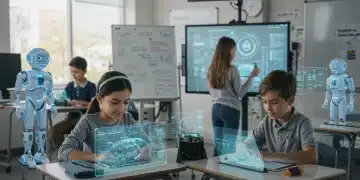Patterns in academic success: 2025 trends to watch

Future skills for academic excellence include critical thinking, digital literacy, collaboration, adaptability, and emotional intelligence, all essential for students to succeed in today’s educational and professional landscapes.
Patterns in academic success are evolving rapidly, and as we approach 2025, they offer valuable insights into what students need to thrive. Curious about how these trends can impact you or your studies? Let’s dive into what’s shaping the future of education!
Understanding the 2025 educational landscape
As we look towards 2025, understanding the educational landscape becomes essential for students and educators alike. Many factors are shaping how education is delivered and experienced. This evolving landscape presents both challenges and opportunities.
Key Trends in Education
Several trends are emerging that significantly impact the way students learn. These include:
- Increased Online Learning: Virtual classrooms are becoming more popular, providing flexibility and access to diverse resources.
- Personalized Education: Tailored learning experiences based on individual student needs are enhancing engagement and outcomes.
- Focus on Social-Emotional Learning: Schools are prioritizing mental health and social skills, recognizing their importance in overall student success.
The integration of technology in education has transformed traditional methods. Students now have access to a plethora of online resources, making it easier to research and collaborate with peers. Additionally, tools like learning management systems allow for real-time feedback and progress tracking.
Emerging Skills for the Future
In this dynamic environment, certain skills will be crucial for students to thrive.
- Critical Thinking: Analyzing information and making informed decisions will be vital.
- Adaptability: Being open to change and learning new skills will help students navigate future challenges.
- Collaboration: Working effectively with others in various settings is more important than ever.
Moreover, educators are embracing innovative teaching strategies. Blended learning, which combines online and in-person instruction, is gaining traction. This approach allows teachers to cater to different learning styles effectively.
As we progress towards 2025, staying informed about these trends will empower students to make better choices about their education. By understanding the educational landscape, learners can better prepare for their future academic and career paths.
Factors influencing academic success
Many factors contribute to academic success, and understanding them is crucial for students and educators. These influences can shape how students perform in their studies, impacting their overall educational journey.
Key Factors
Examining the elements that play a significant role in academic achievement helps identify what students need to focus on.
- Learning Environment: A positive and supportive atmosphere fosters better learning experiences.
- Parental Support: Encouragement and involvement from family can boost motivation and confidence.
- Teacher Quality: Effective teaching leads to deeper understanding and better retention of knowledge.
- Peer Influence: Friends can motivate or distract students, affecting their performance.
In addition to these factors, personal attributes also greatly impact success in academics. Motivation, resilience, and engagement with learning materials are vital for students to thrive.
Personal Attributes
Every student is different, and their personality traits can influence how they tackle challenges. For instance, a student who is naturally curious may actively seek out additional resources, while someone less motivated might struggle.
The development of study skills also plays a pivotal role. Students who learn effective time management and organization techniques often see improvements in their academic performance. This can include setting specific goals, maintaining a study schedule, and breaking down complex topics into manageable parts.
Moreover, mental health is an important consideration in the discussion of academic success. Students facing stress, anxiety, or other emotional challenges may find it hard to concentrate and perform well.
With a focus on these factors influencing academic success, students can find strategies that work best for them. By cultivating a supportive environment, developing personal skills, and seeking help when needed, anyone can enhance their educational outcomes.
The role of technology in learning

Technology plays a crucial role in enhancing learning experiences. Today, students use various tools that promote engagement, understanding, and creativity. With rapid advancements, technology transforms traditional educational methods, making learning more interactive.
Benefits of Technology in Education
There are several benefits to incorporating technology into the classroom. It not only supports student learning but also enriches the overall educational environment.
- Access to Resources: Technology provides students with access to a wealth of information and educational resources online.
- Interactive Learning: Digital tools enable interactive lessons that engage students and make learning more enjoyable.
- Collaboration: Technology facilitates collaboration among students, allowing them to work together, regardless of location.
- Personalized Learning: EdTech solutions offer tailored learning experiences that meet individual student needs and preferences.
As students engage with educational technology, their ability to learn and retain information often improves. Online platforms and applications make it easier to track progress and provide feedback. This immediate response helps students adjust their learning strategies.
Tools and Innovations
Many technology tools are shaping the future of education, pushing traditional boundaries. Learning management systems (LMS) allow seamless organization of materials, assignments, and assessments. Virtual classrooms provide flexibility, letting students attend classes from anywhere.
Moreover, using artificial intelligence in education creates personalized learning pathways. AI analyzes students’ strengths and weaknesses, recommending resources tailored to their learning needs. This not only enhances engagement but also fosters independent learning.
While technology is advantageous, learners must also develop essential skills to navigate this digital landscape effectively. Critical thinking, self-discipline, and adaptability are necessary traits to succeed in a technology-driven learning environment.
By understanding the role of technology in learning, both educators and students can leverage these tools to create more effective and engaging educational experiences. Embracing these advancements can lead to improved outcomes and a deeper understanding of course material.
Effective study habits for students
Having effective study habits is essential for students aiming to achieve academic success. By developing these habits, learners can improve their comprehension, retention, and overall performance in school. Simple strategies can make a big difference in how well students study.
Creating a Study Plan
A well-structured study plan helps students stay organized and focused. Setting specific goals and timelines for each subject is helpful. Consider breaking study sessions into smaller, manageable chunks. This can prevent overwhelm and enhance retention.
- Set Clear Goals: Define what you want to accomplish in each study session.
- Use a Calendar: Keep track of important dates, such as exams and deadlines.
- Stick to a Routine: Allocate dedicated study time every day to build consistency.
In addition to scheduling, maintaining a suitable study environment can impact focus and productivity. A quiet and organized workspace, free from distractions, allows students to concentrate better.
Active Learning Techniques
Incorporating active learning techniques can significantly enhance the studying process. Instead of passively reading materials, students should engage with the content. Techniques such as summarizing information, teaching it to someone else, or creating flashcards make studying more dynamic.
- Practice Retrieval: Test yourself regularly to reinforce knowledge.
- Group Studies: Collaborate with peers to gain diverse perspectives.
- Summarization: Write summaries of what you’ve learned to solidify understanding.
By using these active approaches, students can boost their knowledge retention and comprehension. Adaptation and flexibility in study habits are key to finding what works best for each individual.
Staying Healthy is also crucial for effective studying. Regular exercise, a balanced diet, and sufficient sleep can all enhance cognitive function, making learning easier. When students prioritize their health, they prepare their minds for better academic performance.
In summary, mastering effective study habits requires planning, engagement, and a focus on well-being. With the right strategies in place, students can set themselves up for success in their educational journey.
Future skills for academic excellence
To achieve academic excellence, students must develop future skills that will not only benefit their education but also prepare them for the workplace. As the world evolves, so do the abilities needed to succeed.
Critical Thinking and Problem Solving
One of the essential future skills is critical thinking. Students should learn to analyze information and evaluate different perspectives. Problem-solving skills also come into play, enabling them to tackle complex issues effectively.
- Analyze Information: Question sources and consider biases.
- Evaluate Solutions: Identify the best options when addressing a problem.
- Communicate Effectively: Share ideas clearly and concisely.
These skills are crucial in today’s information-rich environment, where students encounter numerous viewpoints and facts daily.
Digital Literacy
In our technology-driven age, digital literacy has become vital. Students need to be proficient with various digital tools and platforms. This includes understanding how to navigate online resources, create digital content, and protect their privacy.
- Research Skills: Find credible information online efficiently.
- Content Creation: Use technology to create presentations, videos, or blogs.
- Online Safety: Practice good cyber hygiene to protect personal information.
Strong digital literacy allows students to utilize technology to enhance learning and connect with others.
Moreover, collaboration is another skill that fosters academic success. Group projects and teamwork teach students how to work effectively with diverse individuals. Learning to collaborate helps students share ideas and build on each other’s strengths.
Additionally, adaptability is key in an ever-changing educational landscape. Students must learn to adjust to new situations, whether in learning styles, group dynamics, or technological tools. This flexibility equips them to face unexpected challenges during their academic journey.
Finally, emotional intelligence is gaining recognition as an essential future skill. Understanding and managing emotions can significantly enhance interpersonal relationships, which is vital both in and out of the classroom. Students who cultivate this skill tend to work better with peers and navigate social situations with greater ease.
By focusing on these future skills for academic excellence, students can prepare themselves for success not only in their studies but also in their future careers.
In summary, focusing on key skills is essential for students striving for academic excellence. Developing critical thinking, digital literacy, and emotional intelligence can empower learners to navigate their educational journeys effectively. By embracing collaboration and adaptability, students can hone their abilities and prepare for the challenges of the future. Continuing to build these skills will not only enhance academic performance but also equip students for successful careers in an evolving job market.
FAQ – Frequently Asked Questions about Future Skills for Academic Excellence
What are future skills important for academic success?
Future skills such as critical thinking, digital literacy, and emotional intelligence are essential for navigating today’s educational and job environments.
How can I improve my critical thinking skills?
You can enhance critical thinking by analyzing different viewpoints, evaluating sources of information, and engaging in discussions with others.
Why is digital literacy important for students?
Digital literacy is crucial as it enables students to effectively use technology for learning, research, and communication.
What role does collaboration play in education?
Collaboration fosters teamwork, helps students share ideas, and prepares them for working with others in future careers.





